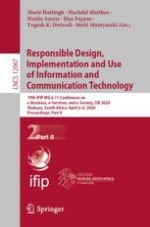2020 | OriginalPaper | Buchkapitel
A Systematic Review on Fake News Themes Reported in Literature
verfasst von : Marlie Celliers, Marie Hattingh
Erschienen in: Responsible Design, Implementation and Use of Information and Communication Technology
Aktivieren Sie unsere intelligente Suche, um passende Fachinhalte oder Patente zu finden.
Wählen Sie Textabschnitte aus um mit Künstlicher Intelligenz passenden Patente zu finden. powered by
Markieren Sie Textabschnitte, um KI-gestützt weitere passende Inhalte zu finden. powered by
